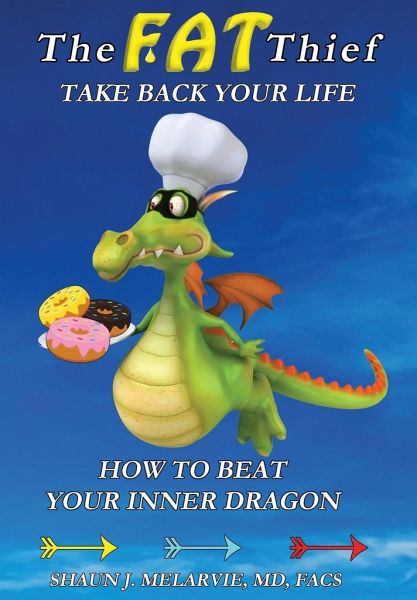
The FAT Thief TAKE BACK YOUR LIFE
HOW TO BEAT YOUR INNER DRAGON
Herausgeber: Zettel-Vandenhouten, Jen
Versandkostenfrei!
Versandfertig in 1-2 Wochen
51,99 €
inkl. MwSt.

PAYBACK Punkte
26 °P sammeln!
What can an overweight or obese person do? In a toxic environment filled with the wrong food and presented with a bewildering array of diet books and advice, he finds himself trapped and confused. Worse yet, even if he thinks he knows what or how he should eat, he can’t bring himself to do it. He says, with St. Paul: "I do not understand what I do. For what I want to do I do not do, but what I hate I do." Dr. Shaun Melarvie’s unique and delightful book The Fat Thief combines several lines of thinking into one singularly helpful volume which goes a long way to solving these problems. First,...
What can an overweight or obese person do? In a toxic environment filled with the wrong food and presented with a bewildering array of diet books and advice, he finds himself trapped and confused. Worse yet, even if he thinks he knows what or how he should eat, he can’t bring himself to do it. He says, with St. Paul: "I do not understand what I do. For what I want to do I do not do, but what I hate I do." Dr. Shaun Melarvie’s unique and delightful book The Fat Thief combines several lines of thinking into one singularly helpful volume which goes a long way to solving these problems. First, he offers a straightforward and even-handed critique of the confusing multiplicity of diets, which range from low fat, high carbohydrate plant-based plans on one end of the spectrum to low carb/high fat ketogenic plans on the other end. He points out either of these approaches (as well as many others) can work and encourages the reader to pick one that the reader likes, but Dr. Melarvie also notes that almost all diets identify many foods in our current environment as problematic. Second, he provides a detailed explanation of fat metabolism and the key role of insulin in the development and maintenance of obesity. His explanation of energy storage as glucose, glycogen, and body fat is fundamental in understanding what makes and keeps us fat. In this regard, Figure D alone (a graph comparing the insulin levels in a typical American diet with those caused by intermittent fasting) is worth the price of the book. Third, Dr. Melarvie provides a brief review of modern physics and both Freudian and cognitive behavioral therapy in the service of explaining why dieters struggle, but also why they should have hope for success. This is an extremely helpful addition. Fourth, he provides a way to understand and use spirituality to improve health. Humans are spiritual beings and treating them as dogs or, worse yet, robots is not only insulting but bound to fail. Dr. Melarvie treats his readers like the spiritual beings they are and provides a plethora of practical tips on prayer, meditation, and belief to benefit those seeking to improve their eating habits. As icing on the cake (or perhaps better "the blueberries on the cottage cheese"), the book has multiple delightful cartoons providing helpful insights and facilitating understanding of what are often complex topics. In summary, The Fat Thief is a valuable and unique book offering not only the obese but all of us an explanation of why we are the way we are, and why we do the things we do, when we eat. For those unfortunate souls who currently inhabit obese bodies, it offers an excellent array of tools to help them escape their predicament. The free online materal, accessible through FatThief.com provides an active and ongoing level of support and education designed to keep the reader engaged throughout their process of transformation. There are no barriers. All that is required of the reader is the courage to start.












